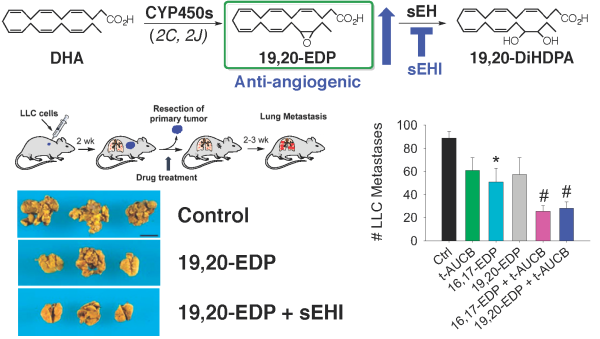Kin Sing Stephen Lee

Research
Molecular Mechanism of Dietary Lipids and Environmental Toxicants on Human Health
(Research Description PDF)
My research program focuses on investigating the effect of the interaction between dietary fatty acids and environmental toxicants on human health using chemical biology methods and state-of-theart instrumentations. More specifically, we are interested in studying the molecular mechanism on how dietary omega-3 and omega-6 polyunsaturated fatty acids (PUFAs) affects human diseases. The metabolites from omega- 3 and omega-6 PUFAs are important lipid signaling molecules that play an important role in inflammation, blood pressure regulation, wound healing, cancer, pain, etc. Therefore, understanding the signaling mechanism of these potent lipid metabolites will lead to alternate treatments for diseases. Currently, we are focused on two different directions to elucidate the mechanism on how omega-3 and omega-6 PUFA metabolites affect human physiology:
1) Identification of the receptors of polyunsaturated fatty acid (PUFA) epoxides. PUFA epoxides are potent lipid mediators with anti-inflammatory, anti-hypertensive, anti-fibrotic and analgesic properties. They also play a vital role in cancer biology. However, even after two decades of research, the signaling mechanism of PUFA epoxides remain largely unknown. To tackle this challenge, we will design analogs of PUFA epoxides. Currently, we have identified several active analogs which allows us to pursue the identification of highly specific and high affinity epoxyeicosatrienoic acid receptor(s). Assstant Professor and Assistant Professor of Pharmacology and Toxicology (b. 1980) B.S., Chemistry 2003, Hong Kong Univ. of Science and Technology; Ph.D., Chemistry, 2010, Michigan State Univ. ; Post-Doctoral Scholar, 2010-14 Univ. of California at Davis; Project Scientist 2014-2016, University of California at Davis 517-884-1813 Kin Sing Stephen Lee
2) Design and synthesis of analogs of omega-3 PUFA epoxide and inhibitor of soluble epoxide hydrolase with improved druglikeness to treat diseases. Omega-3 PUFA epoxides are transient endogenous metabolites which are metabolically unstable and rapidly degraded by an enzyme called soluble epoxide hydrolase. In addition, these fatty acid epoxide are very lipophilic with poor physical properties. Therefore, they are poor drug candidates. Recently, our laboratory have employed a high-throughput screening in order to study the structure-activity-relationship of the omega-3 PUFA epoxides on fibrosis. By understanding the SAR of PUFA epoxides on fibrosis, we will be able to design analogs with better drug-like properties.
Because the soluble epoxide hydrolase (sEH) is the major metabolic enzyme for PUFA epoxides, inhibition of sEH is beneficial to human health through stabilization of PUFA epoxides in vivo. Thus, sEH becomes a prominent therapeutic target. Recently, it has been shown that sEH inhibitors are efficacious on diabetic neuropathic pain model in mice. Unfortunately, the properties of the current sEH inhibitors are not fully optimized. Therefore, we will redesign the structure of the sEH inhibitors to improve their drug-like properties particularly, the drug-target residence time because the drugtarget residence time has been demonstrated to be an important drug parameter to predict in vivo efficacy of the drug.

Contact / Webpage
Area(s) of Interest
Organic (Or)
Biological (Bi)
Selected Publications
w-3 polyunsaturated fatty acids and their cytochrome P450-derived metabolites suppress colorectal tumor development in mice, Wang W, Yang J, Nimiya Y, Lee KSS, Sanidad K, Qi W, Sukamtoh E, Park Y, Liu Z, Zhang G. J., Nutr. Biochem. 2017, 48, 29.
Cyclooxygenase-derived proangiogenic metabolites of epoxyeicosatrienoic acids, Rand AA, Barnych B, Morisseau C, Cajka T, Lee KSS, Panigraphy D, Hammock BD, Proc. Natl. Acad. Sci. U.S.A. 2017, 114, 4370.
Probing the orientation of inhibitor and epoxy-eicosatrienoic acidbinding in the active site of soluble epoxide hydrolase, Lee KS, Henriksen NM, Ng CJ, Yang J, Jia W, Morisseau C, Andaya A, Gilson MK,Hammock BD, Arch. Biochem. Biophys. 2017, 613, 1.
Soluble epoxide hydrolase inhibition and epoxyeicosatrienoic acid treatment improve vascularization of engineered skin substitutes, Supp D, Hahn J, McFarland KL, Combs KA, Lee KSS, Inceoglu B, Wan D, Boyce ST, Hammock BD, Plast. Reconstr. Surg. Glob. Open 2016, 4, e1151.
Epoxy fatty acids mediate analgesia inmurine diabetic neuropathy, Wagner K, Lee KS, Yang J, Hammock BD, Eur. J. Pain 2016, in press.
CV
B.S., Chemistry 2003,
Hong Kong Univ. of Science and Technology;
Ph.D., Chemistry, 2010, Michigan State Univ. ;
Post-Doctoral Scholar, 2010-14 Univ. of California at Davis;
Project Scientist 2014-2016, University of California at Davis